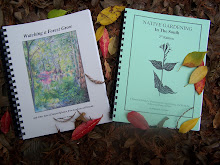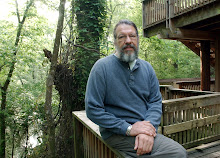“...porch-ful of squash & pumkins
summer's always really somethin'
then fall arrives with a chilly dawn.....”
-- Greg Brown
It always happens so suddenly that it tends to startle us, even after 34 years of living in the woods: you slog thru another steamy searingly hot summer and suddenly one fine morning comes a change. A very subtle change in weather, accompanied by a more unmistakable a change in sounds.
This year The Change occurred the morning of August 15. We shuffle onto the back porch, coffees in hand, ease down into our wal-mart chairs, and bam! Where's the noise??
We're cozied up to a large tract of bottomland hardwood forest within the Bayou Vermilion floodplain – actually/geologically, the combined floodplains of Bayous Vermilion, St. Clair, & Teche (God! What're we doing here??) – so things are still pretty wild here...tons of birds, lizards, snakes, coyote, etc. On normal summer mornings our backyard is a veritable avian Times Square, with hummingbirds, woodpeckers, cardinals, chickadees, titmice, wrens, buntings, finches, rushing about, having breakfast, and hollering like it's the last or first day of their lives. The cardinals and wrens are always the loudest – often obscenely-loud, waking us with their songs thru shut windows and droning air-conditioner – and joined with the tinier songs of the others, the combined noise forces us to speak to one another louder than we'd like at that time of day.
"So didja sleep ok last nite? (pause; no reply) So DIDJA?"
"Huh? What's that y'said?"
Carolina Wren -- Gram for gram, the loudest mouth of the bunch
(photo by Dave Patton, or Beth Erwin or maybe somebody else)
On normal summer mornings added as a symphonic backdrop to the bird cacaphony are the many-layered choruses of cicadas, usually working at decibel levels akin to those of the cardinals and wrens. And their verses are staggered, similar to our 'Row Row Row Yer Boat' song, so that they drone on and on without a break, first climbing higher and then back down the ladder. This cicada symphony itself is backed by a mysterious low-frequency, whirring chorus of some other kind of insect. I've always assumed its origin is some sort of cricket species, but I really don't know. Because it is so absolutely and perfectly continious....whirring on, nonstop, at a single pitch, hour after hour....i sometimes fantasize that it is the actual song-voice of the Universe.
Come late July and August things just keep getting more hectic. By then, young birds of all makes and models join their parents in song, effectively bolstering the noise factor by half or more. Early fall migrants such as flycatchers, gnatcatchers, and vireos turn up looking for food, water, and short rests – and all hollering as well. Migrating hummingbirds horn in on the local hummer scene, cause much consternation and pandemonium, with screaming and chasing ensuing throughout the daylight hours.
Blue-gray Gnatcatcher
(photo by Dave Patton)
As the heat of each day sets in, vireos become more and more consistent with their vocalizations: repetitious hum-drum sing-songs monotonously cycling until peak heat arrives (ca. 3-4pm) when they finally shut it down for a couple of hours. Even more than cicada songs, vireo songs will mesmerize any listener, human and critter alike, to the point of hypnosis and then slumber. Which is all good, since that's precisely what everyone should be doing during that particular intensity of heat.
Red-eyed Vireo
(photo by Matt Conn)
Anyway, imagine then a morning when you wake up and suddenly all of the noise (save for the mysterious whirring one) is gone; or at least drastically modified to the point where you have to focus in order to hear anything at all (besides the mysterious whirring one, that is).
On the morning of August 15, the best that the backyard could muster (besides the mysterious whirring noise) was a few muted cardinal “chits” and maybe a few “cheets” from the finches, chickadees, and titmice – all coming not from the backyard, but now from deeper in the surrounding woods; as if they're all now suddenly become shy and reserved. And no one was in the breakfast line over at the seed feeders. The cicada chorus gets to a very late start, now droning quite a bit lower and slower and unenthusiastically tailing off almost as soon as it begins.
Suddenly then, there is more silence than noise. The effect, as previously mentioned, is physically and emotionally startling. Aha! Where are you, autumn? We feel you out there somewhere!
Dawn on August 15 also began with a noticeable drop in temperature and humidity; and you swear you can feel a hint of a breeze. Yes! And from the north! Well....from the west-northwest....but we'll take it! As the day progresses the breeze, faint as it is, stirs a few migratory hawks over the place. We hear the piercing whistles of Broad-winged Hawks to our north, between the forest canopy and the crawfish ponds; and the songbirds scatter as a Cooper's Hawk crashes through the woods.
young Broad-winged Hawk
(photo by James Beck [i think])
adult Cooper's Hawk pounces
they strike like lightning
(photo by Larry Amy)
Come midday butterflies appear in numbers we haven't seen in a good while – mainly giant swallowtails, checkerspots, and the first of what will become a massive wave of gulf fritillaries by the end of the month – all competing with the transient hummingbirds for nectar from the salvias, turk's caps, obedient plants, and buttonbushes in the beds surrounding the house.
Checkerspot
Fritillary
Yep, summer's on its way out, ya'll. Long live the fall! We know it's out there somewhere...........








